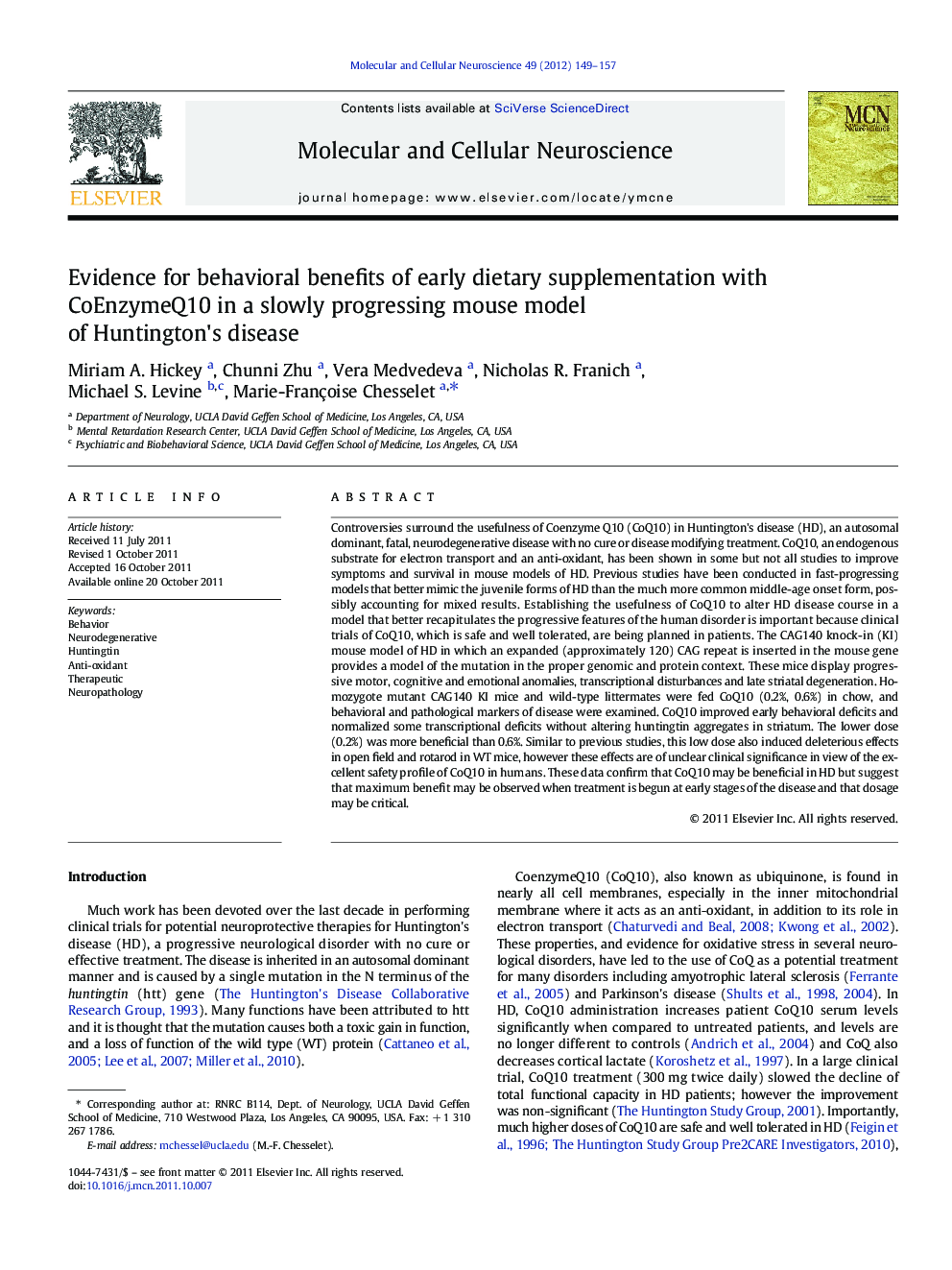| کد مقاله | کد نشریه | سال انتشار | مقاله انگلیسی | نسخه تمام متن |
|---|---|---|---|---|
| 10956546 | 1099384 | 2012 | 9 صفحه PDF | دانلود رایگان |
عنوان انگلیسی مقاله ISI
Evidence for behavioral benefits of early dietary supplementation with CoEnzymeQ10 in a slowly progressing mouse model of Huntington's disease
دانلود مقاله + سفارش ترجمه
دانلود مقاله ISI انگلیسی
رایگان برای ایرانیان
کلمات کلیدی
موضوعات مرتبط
علوم زیستی و بیوفناوری
بیوشیمی، ژنتیک و زیست شناسی مولکولی
بیولوژی سلول
پیش نمایش صفحه اول مقاله

چکیده انگلیسی
Controversies surround the usefulness of Coenzyme Q10 (CoQ10) in Huntington's disease (HD), an autosomal dominant, fatal, neurodegenerative disease with no cure or disease modifying treatment. CoQ10, an endogenous substrate for electron transport and an anti-oxidant, has been shown in some but not all studies to improve symptoms and survival in mouse models of HD. Previous studies have been conducted in fast-progressing models that better mimic the juvenile forms of HD than the much more common middle-age onset form, possibly accounting for mixed results. Establishing the usefulness of CoQ10 to alter HD disease course in a model that better recapitulates the progressive features of the human disorder is important because clinical trials of CoQ10, which is safe and well tolerated, are being planned in patients. The CAG140 knock-in (KI) mouse model of HD in which an expanded (approximately 120) CAG repeat is inserted in the mouse gene provides a model of the mutation in the proper genomic and protein context. These mice display progressive motor, cognitive and emotional anomalies, transcriptional disturbances and late striatal degeneration. Homozygote mutant CAG140 KI mice and wild-type littermates were fed CoQ10 (0.2%, 0.6%) in chow, and behavioral and pathological markers of disease were examined. CoQ10 improved early behavioral deficits and normalized some transcriptional deficits without altering huntingtin aggregates in striatum. The lower dose (0.2%) was more beneficial than 0.6%. Similar to previous studies, this low dose also induced deleterious effects in open field and rotarod in WT mice, however these effects are of unclear clinical significance in view of the excellent safety profile of CoQ10 in humans. These data confirm that CoQ10 may be beneficial in HD but suggest that maximum benefit may be observed when treatment is begun at early stages of the disease and that dosage may be critical.
ناشر
Database: Elsevier - ScienceDirect (ساینس دایرکت)
Journal: Molecular and Cellular Neuroscience - Volume 49, Issue 2, February 2012, Pages 149-157
Journal: Molecular and Cellular Neuroscience - Volume 49, Issue 2, February 2012, Pages 149-157
نویسندگان
Miriam A. Hickey, Chunni Zhu, Vera Medvedeva, Nicholas R. Franich, Michael S. Levine, Marie-Françoise Chesselet,